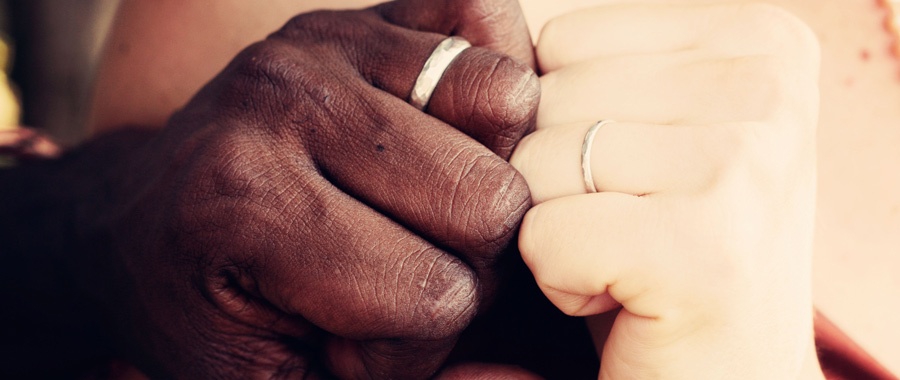The views expressed in our content reflect individual perspectives and do not represent the authoritative views of the Baha'i Faith.
This morning my husband John left for a few days to attend an out-of-town conference. Honestly, I am looking forward to having the house to myself, without another person to plan around.
I can work without distraction, eat when I wish, and watch a movie that doesn’t suit his taste. But I also know the flip-side to this, that I will be eager for his return.
Whenever he goes away, I realize the truth in the saying that “a house is not a home.” His presence, our togetherness, is a huge part of my concept of home. When my own work or travel takes me away, he finds the same thing to be true.
Our home being created through the combination of the two of us represents just one thing I’ve learned through 31 years of marriage. We share a vision of what marriage can be. An eternal relationship between spouses, it can become the source of joy and intimacy in both the physical and the spiritual worlds. Marriage creates a bond, with each partner bearing some responsibility for the well-being of the other.
The Baha’i teachings say that partners in a true marriage:
… should be united both physically and spiritually, that they may ever improve the spiritual life of each other, and may enjoy everlasting unity throughout all the worlds of God.
They are two helpmates, two intimate friends, who should be concerned about the welfare of each other. – Abdu’l-Baha, Selections from the Writings of Abdu’l-Baha, pp. 118, 122.
The Baha’i writings contain many other ideas, such as being like two doves in a nest; and elsewhere spouses are described as being one soul. These may sound contradictory, but as metaphors for a relationship they both work. They speak to the importance within a true marriage of looking in the same direction more than looking at each other:
Marriage, among the mass of the people, is a physical bond, and this union can only be temporary, since it is foredoomed to a physical separation at the close.
… however, marriage must be a union of the body and of the spirit as well, for here both husband and wife … live and move through the same spirit, both are illumined by the same glory. This connection between them is a spiritual one, hence it is a bond that will abide forever. – Ibid., p. 117.
Even with love and unity in a marriage, little things can be annoying. People are still people, and our occasional, often petty differences will not vanish. But the important matters, the life decisions, will be determined through consultation and compromise. The integrity of the marriage is elevated through the preservation of the individuals in it.
A Baha’i marriage is a commitment between equals, with neither partner dominating or controlling the other. Principles such as mutual respect, justice, and unity are applied. Since no roles are automatically assigned, every marriage will have its own way of managing its needs and routines. Comparing to the traditional model within North America and much of the world, a woman’s role is not confined to the home nor is a man’s role just within the workplace.
The Universal House of Justice in a letter to the Baha’is of New Zealand explained it this way:
For example, although the mother is the first educator of the child, and the most important formative influence in his development, the father also has the responsibility of educating his children … Similarly, although the primary responsibility for supporting the family financially is placed upon the husband, this does not by any means imply that the place of woman is confined to the home. – Messages 1963-1986, p. 472
Baha’u’llah described marriage as a “fortress for well-being.” – The Most Holy Book, p. 205. That suggests not only shared physical space (as in a house) but also safety and security. Part of being safe and secure involves being able to express oneself openly and honestly, without fear of retribution. This doesn’t always come easily, and a marriage may require time before partners are comfortable with it.
Marriage partners don’t spend all their time alone within their fortress of well-being. We leave our houses and go into the world, probably even daily. So we can also be the source of happiness to others, for example through offering hospitality. Another important action is to speak well of our spouses, even on days when things may not be at their best. Far from being untruthful, it means keeping on eye on the larger picture and crediting our partners with being well-intentioned.
When we are busy or feeling grumpy, we might forget to offer encouragement and feedback. But communication never stops, and words of praise can go a long way. The old adage “it’s the little things that count” is still true.
As I reflect on marriage I recognize that not everyone is blessed with happy marriages, or even with any marriage at all. Single or married, intentionally so or not, every day is a new experience for ourselves and the people around us. The vision the Baha’i Faith has for marriage offers principles that can be applied to other relationships, too.
Love, unity, commitment, truthfulness, encouragement—it may be that within marriage these take on a specific meaning. Yet every day, beyond our own homes and close relationships, we can take what we know about marriage and use it to help bring more happiness to the world.
















Comments
Sign in or create an account
Continue with Googleor